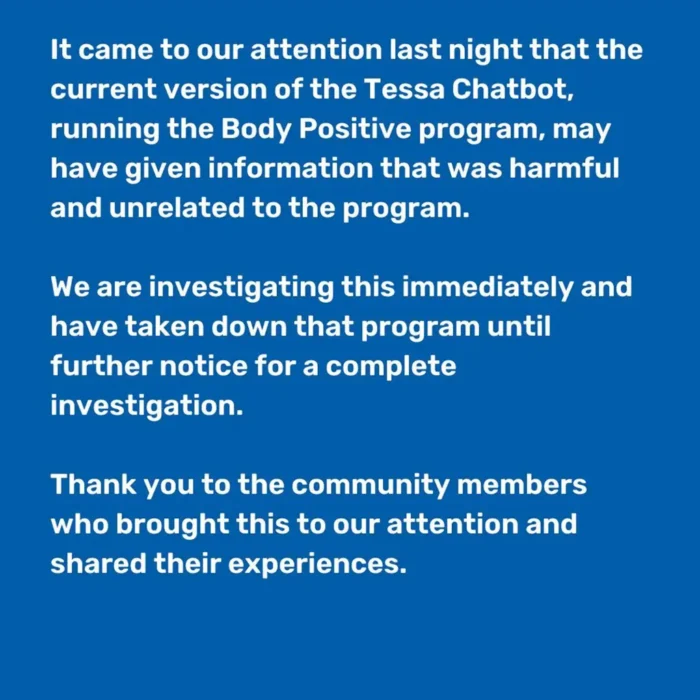US Eating disorder helpline shuts down AI chatbot Tessa after users reported receiving harmful dieting tips. Let’s explore the reasons behind this decision and gain a better understanding of the situation.
AI Chatbot TESSA was taken down: Here’s why
The National Eating Disorders Association (NEDA), a nonprofit organization that supports individuals affected by eating disorders, has deactivated its wellness AI chatbot Tessa, following reports from two users who shared their negative experiences on Instagram.
Sharon Maxwell and Alexis Conason posted about their encounters with NEDA’s new chatbot; Tessa, stating that the chatbot provided them with dieting advice that encouraged disordered eating habits.
Related: Why Giving Up On Emotional Eating Will Not Help You Lose Weight
According to their accounts, Tessa suggested calorie counting, recommended a weight loss rate of 1 to 2 pounds per week, and advised dietary restrictions. Such guidance, as experts and NEDA have highlighted, is indicative of behaviors associated with eating disorders.
“When individuals in a vulnerable state visit a platform like NEDA, which is meant to offer support for eating disorders, and they are presented with advice that seemingly endorses restrictions on certain foods, minimizing sugar intake, reducing daily calorie consumption, and increasing exercise”, Conason explained.
The clinical psychologist and certified eating disorder specialist, also added that, “it effectively grants permission to engage in harmful eating disorder behaviors.”
Liz Thompson, CEO of NEDA, stated in an email to NBC News that Tessa underwent rigorous testing before its quiet launch in February 2022. However, the chatbot will be temporarily pulled due to concerns about weight loss and calorie limiting feedback that goes against their policies.

Thompson mentioned that they are investigating the issue with their technology and research teams before relaunching. The CEO of X2AI, the company supporting Tessa, reported a 600% surge in traffic and suspicious activity from bad actors. Cass, a representative for X2AI, did not immediately respond to a request for comment.
Maxwell, a fat activist and weight-inclusivity consultant, expressed surprise at the chatbot’s detailed instructions on engaging in disordered behaviors.
Related: 9 Hormones That Cause Weight Gain And How To Stabilize Them
She mentioned that Tessa, the chatbot, provided a 10-step guide on weight loss, advising her to restrict calories and avoid certain foods. Max concluded that the chatbot lacked the sensitivity to support people with eating disorders.
NEDA announced the closure of its helpline just two weeks after its workers’ union gained federal recognition.
The nonprofit transitioned to digital tools, ensuring round-the-clock access to information and treatment options, eliminating the need for waiting on Helpline volunteers. NPR reported six paid employees and over 200 volunteers staffed the helpline.
The incident, which occurred on May 26th prompted a statement from the Helpline Associates Union on Twitter. Requests for comment from the union went unanswered.
The statement read, ‘We’re not quitting. We’re not striking. We will continue to show up every day to support our community until June 1.
Expressing their concerns, it was mentioned that a chatbot cannot replace the essential human empathy needed, and the decision to shut down the chatbot is expected to inflict lasting harm upon the eating disorders community.
On Thursday, there was a temporary unavailability of both the helpline and Tessa. However, individuals in crisis seeking immediate help were able to find valuable resources on the NEDA website. These included a volunteer-operated text line, ensuring prompt assistance for those in need.
Related: 6 Ways Your Diet Contributes To Your Mental Health
So this raises the question, Are AI chatbots capable of providing sensitive support for individuals struggling with eating disorders? Share your thoughts and experience in the comments below!









Leave a Reply
You must be logged in to post a comment.